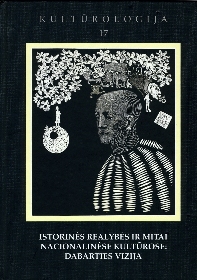„Brolių tautų“ mitas neformaliosios komunikacijos kontekste
Th e Myth of “Brother Nations” in the Context on In formal Communication
Author(s): Rūta MuktupāvelaSubject(s): Cultural Essay, Political Essay, Societal Essay
Published by: Lietuvos kultūros tyrimų
Keywords: Balts; Latvians; Lithuanians; myth; official communication; informal communication, stereotype; virtual space; Estonians; “Baltic gene”.
Summary/Abstract: The myth of Lithuanian – Latvian brotherhood is usually based on XIX c. ethnolinguistic construction – Balts. In Postmodernism scope and time there came up opportunities to experiment and play with social and biological personal identity, to choose and deliberately construct ethnic identity especially in youth and it turns out to be an attractive thing – new real and virtual communities are built up choosing for their communication reconstructed, vanishing or newly created languages, there are attempts to actualize supranational and pre-national identities: it is in style to call oneself a Prussian (Prusas), Selis, Jotvingis etc. In these circumstances the myth of Baltic brother nations remains pretty neutral and acceptable instrument to mobilize strength in globalization conditions to preserve ethnic or national uniqueness or at least its illusion. The theory of culture – “Latvians and Lithuanians are brotherly nations” is intensively used in the official Latvian – Lithuanian interstate, governmental, departmental or Establishment supported cultural communication. In creative and scientific environment it is already doubtful if linguistic similarity is a sufficient ground to affirm cultural kinship. Intelligentsia approach to the “brotherly nations” myth is as is a step of transition between official and unofficial communication. Informal daily communication is rther inert and full of traditional stereotypes – contemporary Latvian attitude towards Lithuanians contains plenty of features attributed to Lithuaninas by 19th century Latvian press, anecdotes and folktales as religiosity, naivety, obscurantism. Virtual space is one of the most actual sources of informal communication facts. The context of informal communication often reveals a wide, pretty contradictory and unexpected, not only positive and friendly but also openly aggressive, even shauvinistic spectrum of mutual evaluation. Reading of various publications and especially their comments make an impression that namely daily communication both maintains and simultaneously ruins the myth of Latvian – Lithuanian brotherhood. It is obvious that not only linguistic legacy forms national identity; cultural, historic and political aspects are not the less important. Maybe, that’s why Latvians while not neglecting linguistic proximity with Lithuanians tend to claim being closer to Estonians by thinking, temper and behaviour. Already in 19th century Latvian linguist, poet and publicist Juris Alunāns stressed that though Latvians and Lithuanians are tied together by their origin, since 13th century they share common fate with Estonians. Nowadays part of Latvian intelligentsia nourish a new mythology about “unique Baltic Gene” based on recent achievements in natural scineces...
Journal: Kultūrologija
- Issue Year: 2009
- Issue No: 17
- Page Range: 245-257
- Page Count: 13
- Language: Lithuanian

